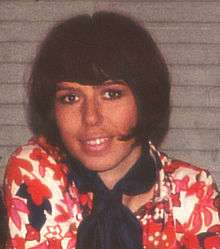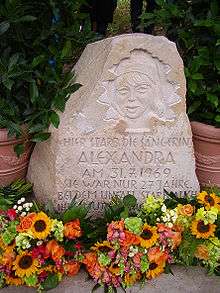Alexandra (singer)
Alexandra was the stage name of German singer Doris Nefedov, née Treitz (May 19, 1942 – July 31, 1969).
Alexandra | |
|---|---|
 Alexandra in 1969 | |
| Background information | |
| Birth name | Doris Treitz |
| Born | May 19, 1942 Heydekrug, East Prussia, Germany |
| Died | July 31, 1969 (aged 27) Tellingstedt, Germany |
| Instruments | Vocalist |
Biography
Doris Treitz was born in Heydekrug, Memelland (today: Šilutė, Lithuania). Due to the flight and expulsion of Germans during and after WWII, her mother had to take her and her two elder sisters to the West. While the father wanted his daughters to aim for office jobs, the mother supported artistic aspirations, and the interest in foreign languages. At age 17, she left school in Kiel to become a fashion designer and actor in Hamburg, studying at Margot-Höpfner-Schauspielschule, working in several jobs to earn the money. At age 19, Doris Treitz took part in the Miss Germany pageant, enjoying being in the spotlight while still living with her mother in a small cheap apartment in Hamburg's Rothenburgsort. In order to pay the rent, they had to lease a room to a Russian, Nikolai Nefedov, who was 49 years old and en route to emigration into the US. Doris fell in love, they married. After their boy Alexander ("Sascha") was born when she was 20, the couple got a divorce and Mr. Nefedov went to America alone. Alexandra has two grandchildren, Dennis Nefedov, born May 1, 1993, and George Nefedov, born September 23, 2008, currently living in Boston, Massachusetts.
As she did not consider her legal name Doris Nefedov as helpful for a career, she chose Alexandra instead, after her son. Before a concert of singer Salvatore Adamo, the crowd booed other new female talents away, until Alexandra won them over with her rather melancholic style. Hans R. Beierlein, the well known German music manager of Udo Jürgens, became her manager, friend and lover.
Alexandra's first hit single, Zigeunerjunge ("gypsy boy"), was released in 1967; several more releases followed, including, Schwarze Balalaika ("black balalaika") and Mein Freund, der Baum ("my friend, the tree"). Most of the songs became no big hits, according to producer Fred Weyrich because they "were ahead of their time". She was forced to record a song not written by herself, Sehnsucht ("yearning") and vowed not to sing it again, yet it became a hit.[1]
In her international career, she performed songs in several other languages besides German as well, including French, English, Russian and Hebrew. In 1968, she performed in Rio de Janeiro, and spent a holiday there, meeting a new lover. In spring of 1969, she was awarded the Golden Europa award for best newcomer. Soon, she had to take a time-out in Davos due to the stress of her career which soon resumed after a move to Munich. She met Pierre Lafaire, and they intended to marry even though her sisters disagreed, suspecting fraud. They split up. Following phone calls, she slept in the same room with her son fearing that her son might get abducted, and wrote her last will in favour of her son and mother.
Death
On July 31, 1969, Alexandra traveled to Hamburg to negotiate with her record company. She took a car shuttle train. The same day, on her way to a holiday on Sylt, Alexandra drove her recently acquired Mercedes-Benz 220 SE Coupé with her son, Alexander, and her mother. On the way, she had the car checked in a workshop before she failed to brake for a crossing, colliding with a truck near the town of Tellingstedt, Holstein under unexplained circumstances. Alexander survived with minor injuries, while Alexandra was killed instantly and her mother died later in hospital. The car may have had mechanical issues, and there was some speculation that the accident was sabotaged.
With 3,000 people attending, Alexandra was buried at the Westfriedhof in Munich: her tombstone is simply labelled "Alexandra".
A biography was published in 1999 by movie director Marc Boettcher; Boettcher received several anonymous threats while researching the circumstances of Alexandra's death, and announced that he would push for a new investigation of the circumstances of her death in 2004 after further research, citing former Stasi documents that revealed that her lover Pierre Lafaire had been an American secret agent in Denmark as well as testimonies contradicting the documented results of the original investigation.
Songs (Selection)

- Erstes Morgenrot
- Zigeunerjunge (Tzigane)
- Sehnsucht (Das Lied der Taiga)
- Illusionen
- Grau zieht der Nebel (Tombe la Neige)
- Was ist das Ziel?
- Die anderen waren schuld
- Those were the days
- Ja lubljú tebjá
- Der Traum vom Fliegen
- Im sechsten Stock
- Accordéon (franz)
- Mein Freund, der Baum
- Schwarze Balalaika
- Auf dem Wege nach Odessa
- Das Glück kam zu mir wie ein Traum
- Am großen Strom
- Kleine Anuschka
- Wenn die letzten lila Astern blühn
- Es war einmal ein Fischer
- Duscha, Duscha
- La taiga (franz)
- Was sind wir Menschen doch für Leute
- Schwarze Engel
References
- Sehnsucht reached number 12 in the German charts, Zigeunerjunge number 22. In summer 1969 her third and last hit was Erstes Morgenrot ("First red sunrise") which topped at number 17. Ehnert, Günter (ed.): Hit Bilanz. Deutsche Chart Singles 1956-1980. Hamburg: Taurus Press, 1990, p. 15
External links
| Wikimedia Commons has media related to Alexandra (singer). |
- "Official" website, supported by family members
- Literature by or about Doris Nefedov (Die Deutsche Bibliothek)